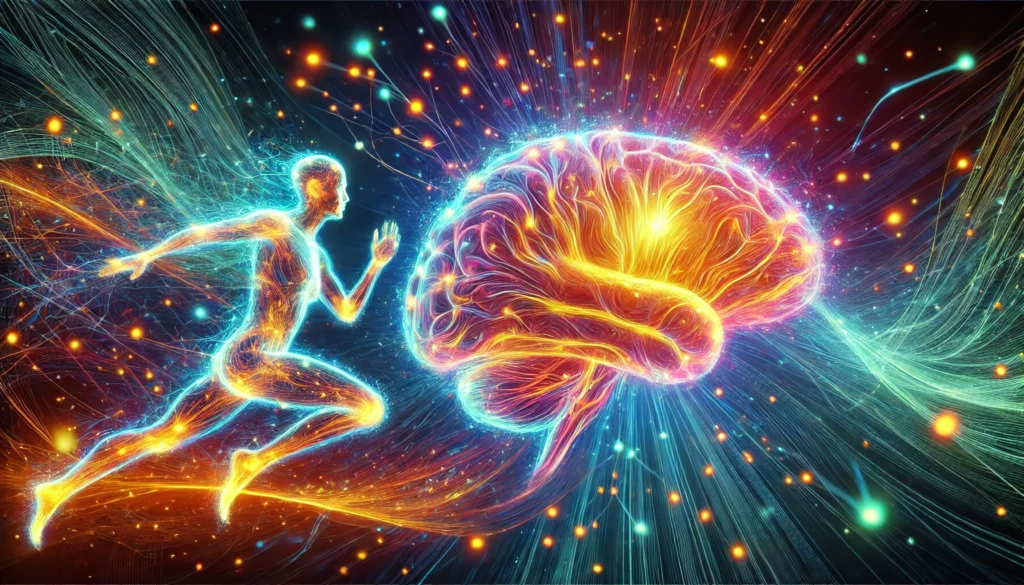Does exercise wake you up? This question underscores a growing curiosity about the relationship between physical activity and mental alertness. While exercise is often celebrated for its physical health benefits, its impact on focus and cognitive function is equally profound. Beyond the obvious energy expenditure, workouts stimulate biochemical processes that can leave you feeling invigorated and mentally sharp. By exploring how exercise influences brain function, we can better understand its role in enhancing focus, productivity, and overall mental clarity.
This article delves into the science behind exercise-induced wakefulness and its implications for cognitive performance. From the immediate effects of a morning jog to the long-term brain benefits of regular physical activity, the connection between exercise and focus is both fascinating and practical. By addressing questions like “does working out wake you up?” and “does exercise wake you up?” we aim to uncover actionable insights for optimizing your physical and mental health.
You May Also Like: Why Do We Sleep? Exploring the Importance of Rest for Optimal Focus and Performance
Exercise and Immediate Wakefulness: A Biochemical Perspective
The immediate aftermath of exercise often involves heightened alertness and a sense of revitalization. This phenomenon is primarily due to the cascade of neurochemical changes triggered by physical activity. When you engage in exercise, your body releases endorphins—the so-called “feel-good” hormones—which contribute to feelings of euphoria and energy. Additionally, exercise stimulates the release of norepinephrine and dopamine, neurotransmitters associated with attention and mood regulation.
Endorphins and Dopamine: The Energy Boosters
Endorphins act as natural painkillers and mood elevators, providing an immediate sense of well-being. Dopamine, on the other hand, enhances motivation and focus by promoting neural communication in brain areas responsible for reward and attention. Together, these neurochemicals create a “runner’s high,” a state of heightened awareness and reduced fatigue that answers the question: does working out wake you up?
Cortisol Regulation and Energy Levels
Exercise also modulates cortisol, a hormone associated with stress. While chronic stress elevates cortisol levels, moderate exercise helps maintain a healthy hormonal balance, reducing stress and enhancing mental clarity. The interplay between cortisol regulation and neurotransmitter activity underscores how exercise promotes wakefulness and focus.
The Role of Cardio in Enhancing Mental Alertness
Cardiovascular exercise, such as running, cycling, or swimming, is particularly effective in promoting wakefulness. Aerobic activities increase heart rate and blood flow, ensuring that oxygen and nutrients are efficiently delivered to the brain. This physiological boost supports cognitive functions like memory, attention, and problem-solving.
Oxygenation and Brain Function
Aerobic exercise improves the brain’s oxygenation, a critical factor for maintaining mental alertness. Enhanced oxygen delivery supports the production of adenosine triphosphate (ATP), the brain’s primary energy currency. This increased energy availability explains why you often feel more awake and focused after a workout.
Cardiovascular Fitness and Cognitive Resilience
Long-term engagement in aerobic exercise builds cardiovascular fitness, which in turn enhances cognitive resilience. Studies have shown that individuals with higher levels of cardiovascular fitness exhibit better memory, quicker reaction times, and greater adaptability to cognitive challenges. This highlights the role of consistent exercise in fostering sustained mental sharpness.
Resistance Training: Building Strength and Mental Stamina
While cardiovascular exercise is renowned for its immediate cognitive benefits, resistance training—such as weightlifting or bodyweight exercises—also plays a crucial role in enhancing mental clarity. Resistance workouts stimulate the production of brain-derived neurotrophic factor (BDNF), a protein essential for brain plasticity and neural growth.
BDNF and Neuroplasticity
BDNF promotes the formation of new neural connections and supports existing ones, facilitating learning and memory. Resistance training, by boosting BDNF levels, contributes to long-term cognitive health. This biochemical response provides another dimension to the question: does exercise wake you up? Resistance workouts not only invigorate the body but also prime the brain for enhanced mental performance.
Hormonal Responses and Cognitive Benefits
Resistance training triggers the release of growth hormone and testosterone, both of which support brain function. These hormones contribute to better mood, sharper focus, and improved energy levels, reinforcing the cognitive benefits of a balanced exercise regimen.

Exercise Timing: Morning Workouts vs. Evening Sessions
The timing of exercise significantly influences its impact on wakefulness and focus. Morning workouts, for instance, are particularly effective in setting a positive tone for the day. Engaging in physical activity early in the morning boosts metabolism, enhances mood, and aligns your circadian rhythms for optimal alertness.
Morning Workouts for Mental Clarity
Exercising in the morning elevates cortisol levels temporarily, which is beneficial for jump-starting the day. This natural cortisol peak, combined with the release of endorphins and dopamine, creates a potent cocktail for enhanced focus and productivity. For individuals wondering, “does exercise wake you up?” morning workouts offer a definitive yes.
Evening Exercise and Sleep Considerations
While morning exercise is ideal for boosting wakefulness, evening workouts can also be beneficial. However, intense exercise close to bedtime may disrupt sleep quality due to elevated adrenaline levels. Balancing exercise intensity and timing is crucial for reaping its cognitive benefits without compromising sleep.
The Long-Term Cognitive Benefits of Regular Exercise
Beyond the immediate boost in alertness, regular exercise yields long-term cognitive benefits. Physical activity reduces the risk of neurodegenerative diseases, enhances memory, and supports overall brain health. These cumulative effects underscore the importance of consistent exercise for sustained mental vitality.
Neuroprotection and Aging
Exercise promotes neuroprotection by reducing inflammation and oxidative stress, two major contributors to cognitive decline. Regular workouts also stimulate the production of antioxidants and anti-inflammatory molecules, creating a brain-friendly environment that supports longevity.
Enhanced Memory and Learning
Studies have consistently shown that exercise improves memory and learning capabilities. By enhancing hippocampal function—the brain region associated with memory—exercise ensures that cognitive processes remain robust throughout life. This long-term perspective answers not only “does working out wake you up?” but also how it supports cognitive sustainability.
Exercise and Mental Health: A Synergistic Relationship
Mental health and physical activity share a bidirectional relationship. Exercise is a proven intervention for managing anxiety, depression, and stress, all of which can impair focus and cognitive function. By improving mood and reducing stress, exercise indirectly enhances mental clarity and wakefulness.
The Role of Endorphins in Mood Regulation
Endorphins play a critical role in mitigating symptoms of anxiety and depression. By elevating these mood-enhancing chemicals, exercise fosters emotional resilience and mental sharpness.
Stress Reduction and Cognitive Focus
Exercise reduces stress by regulating the hypothalamic-pituitary-adrenal (HPA) axis, the body’s primary stress-response system. A well-regulated HPA axis contributes to better focus, energy levels, and overall cognitive performance.
Personalized Exercise Regimens for Optimal Focus
The effectiveness of exercise in enhancing focus varies among individuals, emphasizing the need for personalized regimens. Factors such as fitness level, exercise preferences, and cognitive goals should guide the selection and timing of physical activity.
Tailoring Workouts to Cognitive Goals
For those aiming to enhance focus and wakefulness, a combination of aerobic and resistance training is ideal. Aerobic exercises provide immediate energy and alertness, while resistance training supports long-term cognitive resilience.
Monitoring Progress and Adjusting Routines
Tracking the impact of exercise on mental performance can help refine your regimen. Tools like fitness apps and wearable devices offer insights into activity levels, heart rate, and sleep quality, enabling adjustments for optimal results.

Conclusion: Harnessing the Synergy of Exercise and Focus
Does exercise wake you up? The evidence is clear: physical activity is a powerful catalyst for mental alertness, focus, and overall cognitive health. By stimulating neurochemical processes, enhancing blood flow, and promoting long-term brain health, exercise provides both immediate and lasting benefits.
Whether through a brisk morning jog or an evening strength-training session, integrating regular exercise into your routine can transform both your physical and mental well-being. For those seeking enhanced focus and vitality, the connection between workouts and cognitive performance offers a compelling path forward.
Incorporate exercise into your daily life and experience the profound synergy between physical activity and mental clarity. The answer to “does exercise wake you up?” is not only a resounding yes but also an invitation to explore its transformative potential for focus and productivity.
Further Reading:
Verywell Mind: Can’t Focus? Same. These 5 Tips Will Cure Your Brain Fog Stat
PsychCentral: 9 Brain Exercises to Sharpen Your Memory and Focus
American Psychological Association: Working out boosts brain health
Harvard Health Publishing: Exercise can boost your memory and thinking skills
Important Note: The information contained in this article is for general informational purposes only, and should not be construed as health or medical advice, nor is it intended to diagnose, prevent, treat, or cure any disease or health condition. Before embarking on any diet, fitness regimen, or program of nutritional supplementation, it is advisable to consult your healthcare professional in order to determine its safety and probable efficacy in terms of your individual state of health.
Regarding Nutritional Supplements Or Other Non-Prescription Health Products: If any nutritional supplements or other non-prescription health products are mentioned in the foregoing article, any claims or statements made about them have not been evaluated by the U.S. Food and Drug Administration, and such nutritional supplements or other health products are not intended to diagnose, treat, cure, or prevent any disease.


